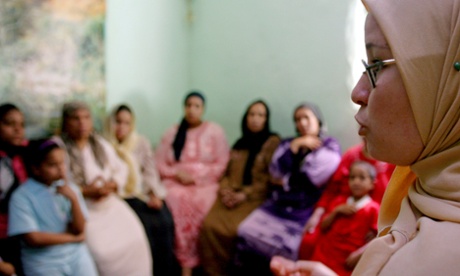
The Obama administration is to carry out a major study into female genital mutilation, in an effort to establish how many women are living with the consequences of FGM in the United States and how many girls are at risk.
The previous study was carried out in 199 , and new research is a central demand of a Guardian-backed campaign, led by Jaha Dukureh, which aims to put an end to the practice. Experts say that FGM, which involves the removal of a girl's outer sexual organs and is often carried out without anaesthetic, often takes place during the summer holidays when American girls are taken out of the country for the purpose. A prevalence study is seen by campaigners as a vital first step in tackling FGM in the US.
Cathy Russell, the US ambassador for global women's issues, confirmed that the study would be carried out by the US Department of Health and Human Services. Speaking to the Guardian at a major summit on FGM and child marriage in London, Russell praised the event for highlighting the issue. "This summit is important because it brings together government, civil society and activists who care and have been working on this issue," she said.
FGM is carried out in 29 countries, and Unicef has estimated that more than 130 million women are living with the consequences, which include heavy bleeding, infections, infertility and death during childbirth. At least 228,000 American women and girls in the US are at risk of the practice, according to previous research from the African Women’s Health Center of the Brigham and Women’s Hospital, but the true number is thought to be much higher.
Young American women who were cut as girls and teenagers on trips back to their parents' countries, a practice known as "vacation cutting", told the Guardian that they had been left scarred physically and emotionally. Lesha, a 21-year-old from a southern state, said she and her sister were sent to Guinea when they were 11 and nine respectively. “I went to Africa to learn about my identity just to end up being scarred for life,” she said.
It also emerged that the Obama administration has set up a preliminary working group on FGM, as the first step to measuring the extent of the problem in the US and deciding how to tackle it. Russell said there had been an "initial meeting"', adding that the group would likely meet again to discuss developments at the London summit. "We've been engaged on this issue for a long time, and now we are trying it get a sense of where we stand", she said.
It is understood the working group will look at how to fight FGM through education, and will also look at how to tackle "vacation cutting".
Dukureh, whose petition calling for the new study on change.org has attracted more than 230,000 signatures, said the US had an opportunity to push for change in its own country and inspire change around the world.
"I'm so excited because this is exactly what we asked for," she said. "It is a great success not just for me but for everyone who has fought for this. But it doesn't stop here, we are not going away. This is a first step in ending FGM in the States, and where the US leads others might follow."
Shelby Quast, policy advisor at Equality Now, which is working on the campaign, said the development was proof that people could make a difference.
"Civil society and survivors have raised their voices and the government has responded to that, she said. "This interagency meeting is a call from the president - it means he is bringing people together to talk about this issue. Now the Obama administration must ensure they get input from survivors like Jaha."

